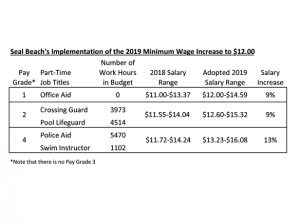So here’s a question for our local business owners who have employees making the minimum wage. When the minimum wage went up on January 1st, did you also give raises to employees already making more than the minimum?
I ask, because this is what the Seal Beach City Council did in January. Instead of just raising the lower end of the impacted salary ranges to $12 per hour (the new minimum wage for larger employers), the Council also gave raises to employees already making more than the new minimum in the middle and top end of these salary ranges (see Table).

For example, Crossing Guards and Pool Lifeguards in the middle of the salary range had their pay increased by over 9% from $12.73 to $13.89 per hour. The middle salary for Police Aids and Swim Instructors rose by almost 13% from $12.92 to $14.59.
The rationale given in the staff report for this taking this approach is based on a bureaucratic attempt to maintain a perfect “salary schedule” with 5% pay differences between successive “Grades.” Accordingly, employees in “Grade 2” jobs (Crossing Guards and Pool Lifeguards) should make 5% more than those in “Grade 1” jobs (Office Aids). There is nothing wrong with this concept, and it is pretty standard in governmental human resource practices. However, in this case, the City does not currently employ any Office Aids, and hasn’t employed any in the last three years.
I suggested to the Council that it would be much simpler and far less costly to just raise all starting salaries to the $12 minimum.
How much less costly? We cannot know for sure because staff provided no cost estimates for their proposed raises or any alternative approach. And no Council Member asked this question.
My best estimate is that staff’s recommendation, which was adopted by the Council, will cost tax payers almost $19,000 per year. This compares to less than $6000 per year to do the minimum required—so, an extra $13,000 a year to do more than the “State mandate.”
I find this rather ironic, since two of the Council Members who voted for these raises repeatedly bemoaned the costs of “unfunded State mandates” in their support of Measure BB last fall. Additionally, these Council Members are well-aware that the voter-approved 1% sale tax increase is a stop-gap measure. Expenses will continue to rise faster than revenue, with staff predictions of a possible budget deficit within four years.
The countdown to the inevitable day when there will need to be another tax increase on the ballot just got $13,000 closer.
Robert Goldberg is a Seal Beach resident.





Postscript: For the record, Mayor Tom Moore was unable to attend this Council meeting, so the vote was 4-0.